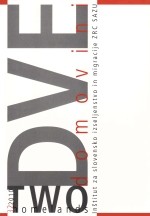Children of Diplomats in (Re)socialisation Turbulences of Migration
Keywords:
migration, resocialisation, acculturation, diplomacy, childrenAbstract
(Continuous) temporary employment of diplomats abroad is a form of migration. The article focuses on the population of children of diplomats and the question of the (re)socialisation processes they experience when moving abroad with their parents. The interpretative scheme of the article is based on the theory of the social construction of reality (Berger, Luckmann) and the theory of acculturation (Redfield), while employing the concept of hegemony (Althusser) and processes of stigmatisation (Goffman). Examples of turbulences discussed are: language competence, status incongruence, status of a foreigner, stigma, split personality, generational conflict, and processes of reintegration upon returning back home, bearing in mind that return in the social/cultural sense, and above all in terms of identity, is not possible.
Downloads
References
Adapting, http://future.state.gov/where/stories/transition/44232.htm (28. 7. 2010).
Althusser, Louis (1980). Ideologija in ideološki aparati države. Ideologija in estetski učinek (ed. Zoja Skušek Močnik). Ljubljana: Cankarjeva založba, 35–99.
Berger, Peter L., Luckmann, Thomas (1988). Družbena konstrukcija realnosti. Ljubljana: Cankarjeva založba.
Changing Points of View, http://future.state.gov/where/stories/transition/44236.htm (28. 7. 2010).
Cultural Adjustments, http://future.state.gov/where/stories/transition/44233.htm (28. 7. 2010).
Goffman, Erving (1963): Stigma. London: Penguin.
Examples of e-education projects in cooperation with the MIRK Institute, http://www. mirk.si/snd/primeri%20IND.html (28. 7. 2010).
I am the child of a diplomat, http://wanderlusting.org/would-you-want-to-be-the-child- -of-a-diplomat (28. 7. 2010)
I’m 31 years old now and was the ‘child’ of diplomat, http://wanderlusting.org/would-you- -want-to-be-the-child-of-a-doplomat (28. 7. 2010).
I was just doing an..., http://wanderlusting.org/would-you-want-to-be-the-child-of-a-diplomat (28. 7. 2010).
Jazbec, Milan (2006). Slovenec v Beogradu 1987–1991. Pohanca: samozaložba.
Južnič, Stane (1977). Socialna in politična antropologija. Ljubljana: Partizanska knjiga.
Južnič, Stane (1983). Lingvistična antropologija. Ljubljana: DDUU.
Južnič, Stane (1989). Politična kultura. Maribor: Obzorja.
Južnič, Stane (1993). Identiteta. Ljubljana: Knjižna zbirka TiP.
Lukšič Hacin, Marina (1995). Ko tujina postane dom. Resocializacija in narodna identiteta pri slovenskih izseljencih. Ljubljana: Znanstveno in publicistično središče.
Lukšič-Hacin, Marina (1999). Multikulturalizem in migracije. Ljubljana: Založba ZRC.
Lukšič-Hacin, Marina (2006). Tematizacija pojmov povratnik in povratništvo. Spet doma?: povratne migracije med politiko, prakso in teorijo (ur. Marina Lukšič-Hacin, Jernej Mlekuž) Ljubljana: Založba ZRC, 133–144.
Lukšič-Hacin, Marina, Mlekuž, Jernej (ur.) (2006). Spet doma?: povratne migracije med politiko, prakso in teorijo. Ljubljana: Založba ZRC.
Lukšič-Hacin, Marina (2009). In kaj je ta transnacionalizem?: razmišljanja ob knjigi Jake Repiča “Po sledovih korenin”: transnacionalne migracije med Argentino in Evropo. Glasnik slovenskega etnološkega društva 47(1–2): 61–66.
Mikola, Maša and Gombač, Jure (2008). Internet kot medij ohranjanja narodne in kulturne dediščine med Slovenci po svetu: stare dileme novih rešitev. Dve domovini / Two Homelands 28: 39–56.
Mlekuž, Jernej (2008). Čapac.si, or on burekalism and its bites. An analysis of selected images of immigrants and their descendants in Slovenian media and popular culture. Dve domovini / Two Homelands 28: 23–37.
Papastergiadis, Nikos (2000). The Turbolence of Migration. Malden: Blackwell Publisher Inc.
Pirnat, Žiga (2009). Analiza problematike enakih možnosti v slovenski diplomaciji. Enake možnosti v slovenski diplomaciji (ur. Žiga Pirnat in ostali). Ljubljana: Založba ZRC, 27–86.
Payne, Michael (1996). A Dictionary of Cultural and Chritical Theory. Blackwell Publishers, Oxford.
Redfield, Robert, Linton, Ralph, Herskovits, and J. Melville (1936). Memorandum for the study of acculturation. American Anthropologist 38: 149–152.
Skok, Martina, Videtič, Jernej (2002). Otroci slovenskih diplomatov in vključevanje v šole. Primorska srečanja 26 (253/54): 28–34.
Umek, Gerhard (1979). Kaj mi pomeni biti Slovenec, Slovenka. Mladi Cankarjevci; glasilo učencev slovenske šole na Dunaju, 3: 6–9.
Vah Jevšnik, Mojca (2008). Migrants with a mandate for nation building: international agency in multi-ethnic Kosovo. Dve domovini / Two Homelands, 27: 29–44.
Vah Jevšnik, Mojca (2009). Building peace for a living. Expatriate development workers in Kosovo. Ljubljana: ZRC Publishing.
Vertovec, Stephen (2001). Transnationalism and Identity. Journal of Ethnic and Migration Studies 27(4): 573–582.
Vizajak, Marta (1979). Moje učiteljevanje na tujem. Slovenski koledar ‘80: 229–233.
Wallraff, Gunter (1986). Čisto na dnu. Ljubljana: Mladinska knjiga.
Wimmer, Andreas and Glick-Schiller, Nina (2003). Methodological Nationalism, the Social Sciences, and the Study of Migration: An Essay in Historical Epistemology. International Migration Review 37(3): 576–610.
Zalokar, Jurij (1991). Mavrična kača. Radovljica: Didakta.
Žitnik, Janja (2008). Statistical facts are human fates: Unequal citizens in Slovenia. Journal of Ethnic and Migration Studies 34(1): 77–94.
Downloads
Published
How to Cite
Issue
Section
License

This work is licensed under a Creative Commons Attribution-NonCommercial-NoDerivatives 4.0 International License.
Authors guarantee that the work is their own original creation and does not infringe any statutory or common-law copyright or any proprietary right of any third party. In case of claims by third parties, authors commit their self to defend the interests of the publisher, and shall cover any potential costs.
More in: Submission chapter





